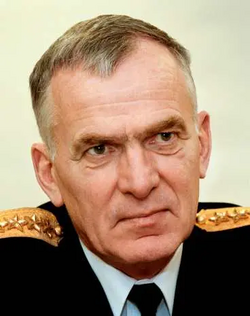Owe Wiktorin | |
|---|---|
 Owe Wiktorin | |
| Birth name | Owe Erik Axel Wiktorin |
| Born | 7 May 1940 Motala, Sweden |
| Allegiance | Sweden |
| Branch | Swedish Air Force |
| Years of service | 1964–2000 |
| Rank | General |
| Commands | |
| Awards | H. M. The King's Medal |
General Owe Erik Axel Wiktorin (born 7 May 1940) is a retired Swedish Air Force officer. Wiktorin had a distinguished military career, culminating in his role as Supreme Commander of the Swedish Armed Forces during the late 1990s and early 2000s. His tenure faced significant challenges due to the changing global security landscape following the end of the Cold War. Wiktorin advocated for a more realistic defence posture in Sweden, recognizing the evolving nature of threats and the erosion of former Soviet military power. He pushed for the modernization of the Swedish Armed Forces to adapt to these changing circumstances.
Contents
- Early life
- Career
- Military career
- Tenure as Supreme Commander
- Later life
- Personal life
- Dates of rank
- Awards and decorations
- Swedish
- Foreign
- Honours
- Bibliography
- References
- Further reading
- External links
Another major challenge was the restructuring of Sweden's defence organizations, resulting in a unified defence force. During this period, Wiktorin highlighted the limitations of European military capabilities and emphasized the need for Europe to develop a self-reliant defence strategy. Despite facing budget cuts and economic pressures, Wiktorin remained committed to advancing Sweden's defence capabilities. His leadership left a lasting impact on the country's defence policies and structures, shaping its response to evolving security challenges.